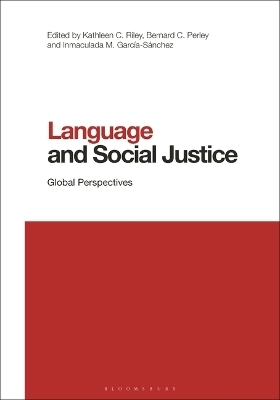
Language and Social Justice
Bloomsbury Academic (Verlag)
978-1-350-24754-3 (ISBN)
- Noch nicht erschienen (ca. September 2025)
- Versandkostenfrei
- Auch auf Rechnung
- Artikel merken
Investigating specific case studies in which language is used to instantiate and/or challenge social injustices, each chapter provides a unique perspective on how language carries value and enacts power by presenting the historical contexts and ethnographic background for understanding how language engenders and/or negotiates specific social justice issues. Case studies are drawn from Africa, Asia, Europe, North and South America and the Pacific Islands, with leading experts tackling a broad range of themes, such as equality, sovereignty, communal well-being, and the recognition of complex intersectional identities and relationships within and beyond the human world.
Putting issues of language and social justice on a global stage and casting light on these processes in communities increasingly impacted by ongoing colonial, neoliberal, and neofascist forms of globalization, Language and Social Justice is an essential resource for anyone interested in this area of research.
Kathleen C. Riley is Assistant Teaching Professor of Linguistic Anthropology at Rutgers University, USA. Bernard C. Perley is Associate Professor and Director of the Institute for Critical Indigenous Studies at the University of British Columbia, Canada. Inmaculada M. García-Sánchez isProfessor of Social Research Methodology and Associate Director of the Center for the Study of International Migration at the University of California, Los Angeles, USA.
List of Figures
List of Tables
List of Contributors
Acknowledgements
Introduction: Global Entanglements of Language and Social Justice, Inmaculada M. García-Sánchez (University of California, USA), Kathleen C. Riley (Rutgers University, USA) and Bernard C. Perley (University of British Columbia, Canada)
Part I: Challenging Linguistic Ideologies and Exclusions
1. A Language Socialization Approach to Humanizing Ethnographic Methods in Latinx Families’ Homes, Ariana Mangual Figueroa (City University of New York, USA) and Sera Hernández (San Diego State University, USA)
2. Language Access and Deaf Activism in Mexico and Nepal,Erika Hoffmann-Dilloway (Oberlin College, USA) and Anne E. Pfister (University of North Florida, USA)
3. Multilingual Activism as Acts of Linguistic Citizenship in South Africa, Quentin Williams (University of the Western Cape, South Africa)
4. Colonialism and Language Politics in Puerto Rico, Sherina Feliciano-Santos (University of Michigan, USA)
5. Labels, Codes, and Language Sovereignty in the Pacific, Kathleen C. Riley (Rutgers University, USA) and Christine Jourdan (Concordia University, Canada)
Commentary, Patricia Baquedano-López (University of California, USA)
Part II: Confronting Hate and Violence
6. The Humpty Dumpty Mistranslation and Misrepresentation Deployed in the British Colonization of Aotearoa/New Zealand, Margaret Mutu (University of Auckland, New Zealand)
7. The Linguistic Defense of White Comfort in Rio de Janeiro, Brazil, Jennifer Roth-Gordon (University of Arizona, USA)
8. (Con)sensual Sexual and Reproductive Justice for Indigenous Women and Girls through Beadwork and Burlesque, Brittany Johnson (MacEwan University, Canada)
9. Telling Truths, Keeping Silence in the Aftermath of War in Sarajevo, Keziah Conrad
10. Arabic and the Discursive Contours of Islamo-Linguistic-Phobia in Spain and France, Inmaculada M. García-Sánchez (University of California, USA) and Chantal Tetreault (Michigan State University, USA)
Commentary, Luisa Martín-Rojo (Universidad Autónoma de Madrid, Spain)
Part III: Decoding Globalized Interactions
11. Seafarers' Talk about (In)Justice on the “Good Ship”, Johanna Markkula (Central European University) and Sonia Das (New York University, USA)
12. Barcelona Street Vendors’ Voice and the Crossing of Narrative (B)Orders, Laura Menna (Independent Researcher) and Eva Codó (Universitat Autònoma de Barcelona, Spain)
13. Interdiscursive Dimensions of Mobility and Precarity for Guatemalan Indigenous Youth, Jennifer F. Reynolds (University of South Carolina, USA)
14. Regimes of Organization in Danish Legal Interpreting, Martha Karrebæk (University of Copenhagen, Denmark) and Marta Kirilova (University of Copenhagen, Denmark)
15. Keywords Decolonized? The Social Lives of Wenhua/Culture and the Spectre of Symbolic Violence in Chinese-English Dialogues, Louisa Schein (Rutgers University, USA)and Fan Yang (University of Maryland, USA)
Commentary, Miyako Inoue (Stanford University, USA)
Part IV: Negotiating Resources in the Anthropocene
16. Global Languages and Communicative Inequality in the “Last Place” on Earth, James Slotta (University of Texas, USA) and Courtney Handman (University of Texas, USA)
17. Pursuit of Health/Communicative Justice through an Intercultural Health Model in Gulumapu (Chile), Jennifer Guzmán (SUNY Geneseo, USA)
18. Inscribing Social Justice through Indigenous Place Names, Bernard C. Perley (University of British Columbia, Canada)
19. Discursive Resistance, Communicative Refusal, and Food Provisioning in Santiago de Cuba, Hannah Garth (Princeton University, USA)
20. Discursive Constructions of Non-Human Beings and the Contingency of Moral Consideration for Local Wildlife, Paul B. Garrett (Temple University, USA) and Rebecca Michelin (Independent Researcher)
Commentary, Barbra Meek (University of Michigan, USA)
Index
| Erscheint lt. Verlag | 19.9.2025 |
|---|---|
| Reihe/Serie | Contemporary Studies in Linguistics |
| Verlagsort | London |
| Sprache | englisch |
| Maße | 169 x 244 mm |
| Themenwelt | Geisteswissenschaften ► Sprach- / Literaturwissenschaft ► Sprachwissenschaft |
| Sozialwissenschaften ► Ethnologie | |
| Sozialwissenschaften ► Soziologie | |
| ISBN-10 | 1-350-24754-5 / 1350247545 |
| ISBN-13 | 978-1-350-24754-3 / 9781350247543 |
| Zustand | Neuware |
| Informationen gemäß Produktsicherheitsverordnung (GPSR) | |
| Haben Sie eine Frage zum Produkt? |
aus dem Bereich


